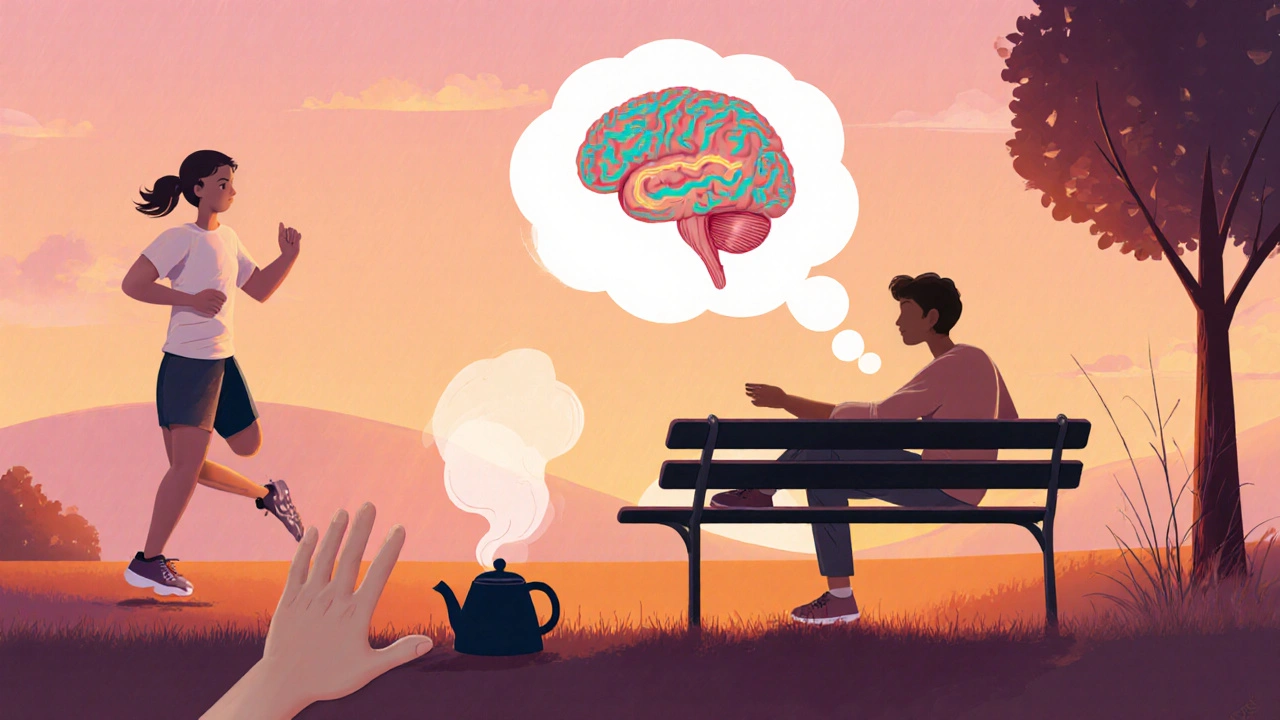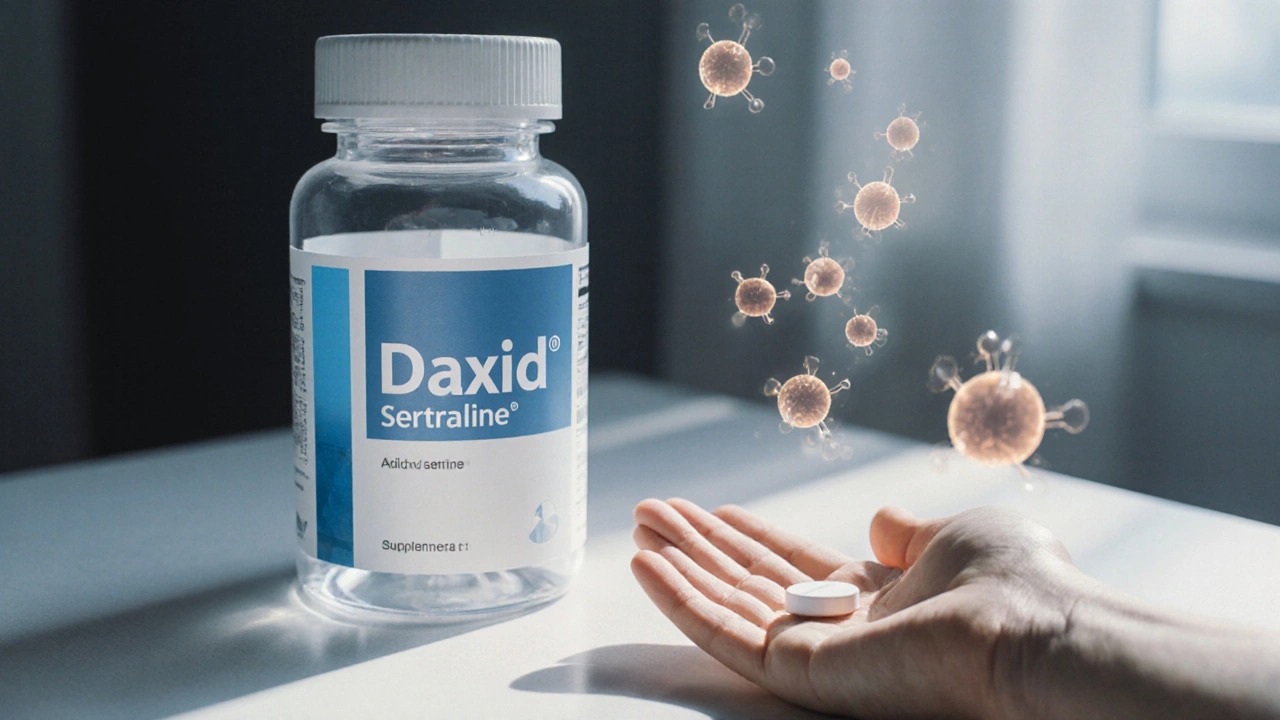Antidepressant Choice Guide
Recommended Antidepressant
Pros & Cons of Each Option
Daxid (Sertraline)
- Strong evidence for depression and anxiety
- Cheap generic
- Once-daily dosing
- Sexual side effects
- GI upset possible
Escitalopram
- Often most tolerable SSRI
- Low dose needed
- Good for older adults
- Slightly higher cost
Fluoxetine
- Long half-life
- Helpful for missed doses
- Can be activating
- Weight gain risk
Venlafaxine
- Hits both serotonin and norepinephrine
- Good for mixed anxiety-depression
- Blood-pressure monitoring
- Discontinuation withdrawal
Bupropion
- Low sexual side-effects
- May aid smoking cessation
- Raises seizure risk
- Not ideal for pure anxiety
Key Takeaways
- Daxid (sertraline) is an SSRI that works well for many but can cause sexual side effects and weight changes.
- Escitalopram and fluoxetine are the closest SSRIs; they share efficacy with slightly different side‑effect profiles.
- Venlafaxine (SNRI) and bupropion (NDRI) offer non‑serotonergic options for people who struggle with serotonin‑related issues.
- Non‑drug approaches like CBT can be combined with meds for faster relief.
- Choosing the right treatment hinges on symptoms, medical history, tolerance, and personal preferences.
When you type "Daxid" into a search bar you’re probably wondering if it’s the right pill for your mood swings, or if there’s a better option out there. Below you’ll get a clear‑cut rundown of what Daxid actually is, how it measures up against the most common alternatives, and a quick decision guide to help you land on a choice that feels right for you.
Daxid is the brand name for sertraline, an FDA‑approved selective serotonin reuptake inhibitor (SSRI) used to treat major depressive disorder, anxiety, obsessive‑compulsive disorder, and panic attacks. It hit the market in 1991 and has since become one of the world’s best‑selling antidepressants. If you’ve been prescribed Daxid, you’re likely taking it because it balances serotonin levels in the brain, which can lift mood and calm anxious thoughts.
Depression is a medical condition characterized by persistent low mood, loss of interest, and a range of physical symptoms such as fatigue and sleep disturbances. While lifestyle tweaks help, most people need a medication to break the biochemical cycle that keeps them stuck. That’s where the choice of antidepressant matters.
SSRIs, the class Daxid belongs to, work by blocking the re‑absorption of serotonin, a neurotransmitter linked to happiness and anxiety regulation. By keeping more serotonin in the synaptic gap, the brain’s mood‑centers get a steadier signal. It’s a simple idea, but the real‑world effects differ from drug to drug.
How Daxid Stacks Up Against Its Peers
Below is a side‑by‑side look at the most frequently prescribed alternatives. The table focuses on five practical factors: typical starting dose, common side effects, weight impact, sexual side effects, and any special warnings.
| Medication | Typical Starting Dose | Common Side Effects | Weight Change | Sexual Side Effects | Special Considerations |
|---|---|---|---|---|---|
| Daxid (Sertraline) | 50mg daily | Nausea, insomnia, dry mouth | Neutral to slight loss | Often reduced libido | Interaction with warfarin, caution in pregnancy |
| Escitalopram | 10mg daily | Dizziness, somnolence | Usually neutral | Similar to Daxid, but sometimes milder | Well‑tolerated in older adults |
| Fluoxetine | 20mg daily | Headache, agitation | Weight gain possible | Moderate risk of sexual dysfunction | Long half‑life; less withdrawal |
| Venlafaxine | 37.5mg daily | Increased blood pressure, nausea | Weight gain trending | Less sexual side‑effects than SSRIs | Monitor BP; abrupt stop causes withdrawal |
| Bupropion | 150mg once daily | Dry mouth, insomnia | Weight loss possible | Minimal sexual side‑effects | Avoid in seizure disorders; no serotonergic action |
Notice that each drug has a distinctive side‑effect fingerprint. If sexual dysfunction is a deal‑breaker, bupropion might be your best bet. If you’re worried about blood‑pressure spikes, an SSRI like Daxid or escitalopram could be safer.
Pros and Cons of Each Option
Daxid (Sertraline) - Pros: solid evidence for depression and anxiety, cheap generic, once‑daily dosing. Cons: sexual side effects, occasional GI upset, can interact with certain blood thinners.
Escitalopram - Pros: often the most tolerable SSRI, low dose needed, fewer drug‑drug interactions. Cons: slightly higher cost than generic sertraline, may cause QT‑interval prolongation in rare cases.
Fluoxetine - Pros: long half‑life reduces withdrawal, helpful for patients who miss doses. Cons: can be activating (makes some people jittery), weight gain risk.
Venlafaxine - Pros: hits both serotonin and norepinephrine, good for mixed anxiety‑depression. Cons: blood‑pressure monitoring required, abrupt discontinuation can feel like flu.
Bupropion - Pros: low sexual side‑effects, may aid smoking cessation, can help with fatigue‑related depression. Cons: raises seizure risk at high doses, not ideal for pure anxiety.
When Non‑Drug Options Make Sense
Medication isn’t the only tool in the toolbox. Cognitive Behavioral Therapy (CBT) has a robust evidence base for mild‑to‑moderate depression. Combining CBT with a low‑dose SSRI often leads to quicker remission and gives you a safety net in case you need to taper off meds later.
Exercise, regular sleep, and a balanced diet also shift serotonin levels naturally. While they rarely replace a prescription for severe depression, they can boost the effectiveness of any medication you choose.

Decision Guide: Picking the Right Treatment for You
- Identify your primary symptoms. If anxiety dominates, an SSRI (Daxid, escitalopram) is usually first‑line. If low energy and weight loss are biggest issues, bupropion may fit better.
- Review medical history. History of hypertension steers you away from venlafaxine; seizure disorder rules out bupropion.
- Consider side‑effect tolerance. Sexual dysfunction? Try bupropion or CBT alone. Weight gain worries? Look at fluoxetine or bupropion.
- Check drug interactions. Daxid can raise levels of drugs metabolized by CYP2C19; escitalopram has a cleaner profile.
- Talk to your prescriber. Bring this table, discuss your lifestyle, and ask for a trial period (usually 4-6 weeks) to gauge response.
Remember, the “right” medication often means the one that works best for a few weeks, then gets swapped if side effects outweigh benefits.
Practical Tips & Common Pitfalls
- Start low, go slow. Even if the label says 50mg, many clinicians begin at 25mg to reduce nausea.
- Take it at the same time daily. Consistency keeps blood levels steady.
- Don’t stop abruptly. Taper over 2-4 weeks to avoid discontinuation syndrome (electric‑shock sensations, dizziness).
- Monitor mood changes. If you feel more agitated or have suicidal thoughts in the first two weeks, call your doctor immediately.
- Watch for drug interactions. Over‑the‑counter cold meds containing dextromethorphan can increase serotonin too much.
Frequently Asked Questions
How long does it take for Daxid to work?
Most people notice a mood lift after 2-4 weeks, but full therapeutic effect can take up to 8 weeks. Patience and regular follow‑up are key.
Can I switch from Daxid to another antidepressant?
Yes. Your doctor will usually cross‑taper-gradually lowering Daxid while raising the new drug-to avoid withdrawal symptoms.
Is Daxid safe during pregnancy?
Sertraline is classified as Category C in Australia, meaning risk can’t be ruled out. Discuss benefits vs. risks with your obstetrician.
What should I do if I experience severe nausea?
Take the dose with food, split it into two smaller doses, or talk to your doctor about switching to a different SSRI.
Are there natural alternatives to Daxid?
St.John’s Wort, omega‑3 fatty acids, and regular aerobic exercise have modest evidence. They’re best used under a clinician’s supervision, especially if you’re already on meds.
Choosing an antidepressant feels personal, but it’s also a science. Use the comparison table, weigh your lifestyle, and have an open chat with your prescriber. Whether you stick with Daxid or move to escitalopram, venlafaxine, or a non‑drug plan, the goal stays the same: get your mood back on track and keep it there.




Manish Singh
I totally get how confusing it can be when you start looking at sertraline vs the other options. It’s normal to feel a bit overwhelmed, especially with all the side‑effect tables. Just take one step at a time and talk to your doc about what matters most to you.
Dipak Pawar
When dissecting the pharmacodynamic profiles of SSRIs, one must consider the nuanced interplay between serotonin reuptake inhibition potency and downstream receptor desensitization kinetics; sertraline, for instance, exhibits a high affinity for the SERT protein, which translates clinically into robust efficacy across both major depressive disorder and generalized anxiety disorder spectrums. The comparative cost‑effectiveness analysis further underscores sertraline’s generic advantage, albeit with a marginally higher incidence of sexual dysfunction relative to escitalopram. Moreover, the half‑life of sertraline, approximating 26 hours, facilitates a once‑daily dosing regimen, thereby enhancing adherence metrics in real‑world populations. In contrast, fluoxetine’s elongated half‑life of approximately five days confers a unique washout benefit but also predisposes to accumulation concerns in polypharmacy contexts. Venlafaxine, as an SNRI, extends its mechanism to norepinephrine reuptake inhibition, offering therapeutic leverage in mixed anxiety‑depressive phenotypes, yet mandates vigilant blood‑pressure monitoring due to its dose‑dependent hypertensive potential. Bupropion’s dopaminergic and noradrenergic activity circumvents serotonergic side‑effects, rendering it a viable candidate for patients plagued by SSRI‑induced sexual dysfunction, though its seizure threshold modulation necessitates caution in individuals with pre‑existing seizure disorders. Ultimately, the decision matrix should integrate primary symptomatology, comorbid medical history, tolerability thresholds, and lifestyle factors such as smoking cessation ambitions. A shared decision‑making model, buttressed by evidence‑based guidelines, empowers patients to navigate these complexities with greater agency and therapeutic optimism.
Nina Vera
OMG, Daxid is literally the drama queen of antidepressants!
Christopher Stanford
Honestly, the data in that article is half‑baked and the tone is pure marketing fluff. It reads like a brochure, not a balanced review.
Steve Ellis
I’ve been on sertraline for a few months and the mood lift was noticeable after about three weeks. The side‑effects were manageable – a little nausea at first, but it settled. What helped me most was pairing it with CBT; the combined effect felt like a turbo boost. If you’re worried about the sexual side‑effects, talk to your doctor about dose tweaking or a short break; many find it lessens over time. Overall, Daxid gave me a solid foundation to rebuild my daily routine.
Jennifer Brenko
While your anecdotal experience is noted, it fails to address the broader epidemiological concerns surrounding SSRI over‑prescription in western societies. The article glosses over the potential for iatrogenic dependence and the socioeconomic forces that drive pharmaceutical lobbying.
Harold Godínez
Strictly speaking, the statement about ‘over‑prescription’ lacks citation. A balanced view would reference recent meta‑analyses showing both benefit and risk profiles. Also, the phrase ‘pharmaceutical lobbying’ is a loaded term; it requires concrete evidence.
Sunil Kamle
Ah, the decision guide – a masterpiece of bureaucratic optimism, isn’t it? Nothing says “personalized care” like a click‑through questionnaire that promptly dumps a one‑size‑fits‑all recommendation.
Jillian Bell
Don’t forget that big pharma has been secretly embedding micro‑chips in pill caps to monitor compliance. That’s why you see the same “best‑match” algorithm everywhere – it’s all part of the grand surveillance scheme.
Lindsey Bollig
While the conspiracy angle is entertaining, the real takeaway is that open communication with your prescriber can demystify those algorithms. Ask about the rationale behind each recommendation and you’ll feel more empowered.
Daniel Buchanan
When navigating antidepressant options, consider the following framework: assess primary symptom clusters, evaluate comorbid medical conditions, prioritize side‑effect tolerability, and finally, align with patient preferences. This structured approach can streamline decision‑making and reduce trial‑and‑error periods.
Lena Williams
Thats really helpful, but i also want to mention that the whole process cant be reduced to a checklist. people have real feelings an experiences. The article could use more personal stories to show how these guidelines play out in everyday life.
Sierra Bagstad
To clarify, sertraline’s efficacy in major depressive disorder is supported by multiple double‑blind, placebo‑controlled trials demonstrating a statistically significant reduction in Hamilton Depression Rating Scale scores (p < 0.01). Additionally, its safety profile is comparable to other first‑line SSRIs, with discontinuation rates below 15% in long‑term studies.
Alan Kogosowski
From a pharmacoeconomic standpoint, the cost‑utility ratio of sertraline versus escitalopram reveals a marginal advantage for sertraline, primarily due to its generic status and widespread insurance coverage. However, when assessing patient‑reported outcome measures, escitalopram often scores higher on tolerability indices, especially concerning sexual dysfunction and weight gain. Therefore, clinicians must weigh direct medication costs against indirect costs associated with side‑effect management and quality‑adjusted life years (QALYs). In practice, a shared decision‑making model that incorporates both economic and patient‑centric data yields the most balanced therapeutic plan.
Ben Lee
I agree with the economic analysis presented. It’s crucial to remember that individual variability can shift these ratios dramatically, so the ‘one‑size‑fits‑all’ approach is rarely appropriate.
David Brice
This guide is a total waste of time. It pretends to be scientific but just tosses in buzzwords and hopes you’ll swallow it. People deserve better than this half‑baked nonsense.
Mina Berens
👍💊
Caroline Lane
Honestly, promoting these meds without highlighting the long‑term dependency risks is morally reprehensible. We should be urging patients to look at lifestyle changes first, not pushing a pill.
Geneva Lyra
It’s important to keep a balanced perspective: medication can be a lifesaver for many, but it should always be combined with therapy and healthy habits. Everyone’s journey is unique.